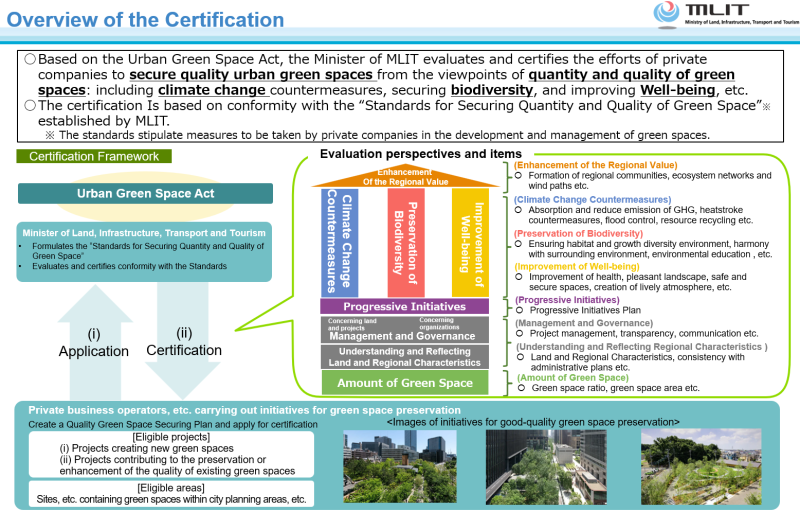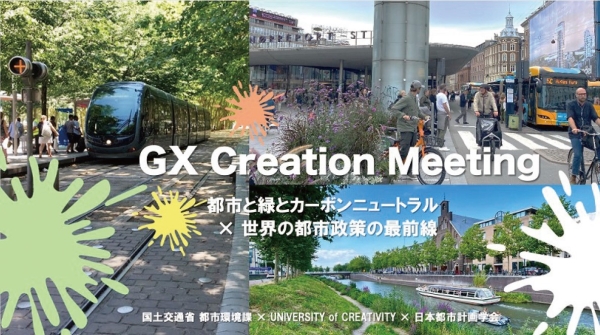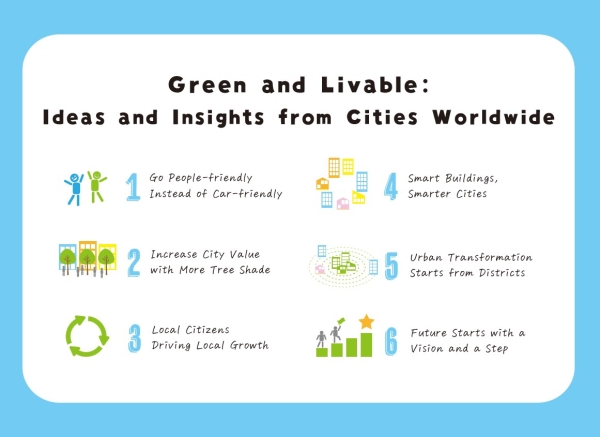Green Transformation for Sustainable Urban Development
As the social situations around urban areas - in which populations, assets and industries are concentrated – change, the government is increasingly required to take proactive action to address global scale issues, such as accelerated climate change and the threats to biodiversity security.
Demands to improve Well-being are also rising year after year due to changes in our lifestyles caused by the COVID-19 pandemic, creating an urgent need for efforts to realize human-centered urban development.
In response to these issues, it is vital to take actions for securing urban green spaces in terms of both quality and quantity, as these spaces are crucial for resolving challenges as green infrastructure with diverse functions.
Urban Green Space Act
This act will promote to secure urban green space, both in terms of quality and quantity, in urban areas for issues such as climate change, biodiversity, and well-being. For sustainable urban development, the act was partially amended in May 2024.
Evaluation and Certification System for Securing Quality Green Space

↑Click the banner for English web site of the certification

In June 2023, MLIT released the report of the “Committee on Evaluation to Secure Quality Urban Green Spaces through Private Sector Investment”.
Based on the report, we continuously discuss on the detailed indicators and metrics of the system with the “Committee on Evaluation Indicators and Metrics to Secure Quality Urban Green Space through Private Sector Investment”.
〈Committee on Evaluation to Secure Quality Urban Green Spaces through Private Sector Investment〉(from February 2023 to June 2023)
・Member List [PDF]
・Report [PDF]
・Concept Paper [PDF]
・Summary [PDF]
〈Committee on Evaluation Indicators and Metrics to Secure Quality Urban Green Space through Private Sector Investment〉 (from October 2023 to September 2024)
・Member List [PDF]
・Certification System for Securing Quantity and Quality Urban Green Space [PDF]
〈Associated Materials〉
・The Standards for Securing Quantity and Quality Green Space [PDF]
・Implementation Guideline [PDF]
〈Committee on Evaluation Indicators and Metrics for Certification System for Securing Quantity and Quality Urban Green Space〉(from October 2025)
・Member List[PDF]
Initiatives for Urban Decarbonization
Current projections estimate that by 2050, approximately 70% of the global population will reside in urban areas. Cities are nexuses where people, goods, and energy converge. In Japan, for instance, approximately 50% of CO2 emissions are attributable to urban activities. However, cities can also be the site of innovation to reduce CO2 emissions. Making changes to how people live in cities is an important step in reducing the impact of climate change.

MLIT is leading a new initiative aimed at promoting exchange, integration, and collaboration among professionals and citizens engaged in carbon neutrality and urban policies. As part of this effort, MLIT organized a series of seminars called the “GX Creation Meeting” in 2024, focusing on climate change initiatives in cities around the world. Experts and practitioners working in relevant policy areas were invited to share their insights with the participants.
Please check the booklet bellow for a summary of the learnings from the seminar.
〈Ideas and Insights for Green and Livable City〉


